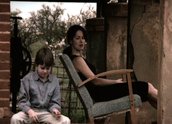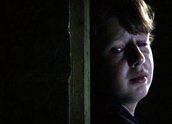


Modern Love (2006)
Synopsis
City businessman John (Mark Constable) inherits a remote farm from his uncle Tom (Don Barker), a recluse said to have committed suicide. With wife Emily (Victoria Hill) and young son Edward (William Traegar), John travels to the farmhouse for what’s intended to be a brief visit settling details of the estate. Soon after arriving, John hears voices that compel him to stay. Wanting to be left alone on the property, he sends Emily and Edward to wait at a drab motel in a strange nearby town. As childhood memories haunt him, John starts dressing in his uncle’s clothes and becomes convinced that Tom, whose body was never found, is still alive. Concerned about her husband’s deteriorating mental condition and the strain it’s placing on their marriage, Emily sets out to discover the truth about John’s past. As details come to light, the spectre of a family curse is raised, and it seems Edward may be its next victim.
Curator’s notes
An extremely rare example of Australian gothic psychodrama, Modern Love looks and feels much more like a European art movie than an Aussie outback drama. Privately financed and executed with considerable artistry on a small budget, this intriguing puzzle box marked a notable debut for British born, South Australian based filmmaker Alex Frayne. It is a relatively obscure movie and probably better known overseas. Selected for many international festivals including Moscow, Shanghai and Locarno, the sole Australian festival to screen it was Adelaide and it received only a very small domestic release in November 2007.
A multi-layered mood piece played in a deliberately low key, Modern Love defies easy categorisation. There are certainly horror and thriller elements in the story of ordinary man John undergoing extraordinary personality change, but there are also deeper currents in the screenplay by Nick Matthews, who also shot the movie on the rarely used Super-16mm format. One of the strongest themes is the double-edged relationship between white urban Australians and the outback. By draining nearly all colour from the images, Modern Love looks radically different from most Australian movies set in wide open spaces. There are no loving shots of beautiful landscapes under brilliant blue skies here. The distinctly non-travelogue photography expresses fears of lurking danger that sit uncomfortably alongside the outback’s romantic status in the national consciousness. Other films that play upon the threatening nature of the Australian outback include Wake in Fright (1971), Picnic at Hanging Rock (1975) and Japanese Story (2003). In Modern Love the land is characterised as a predatory force that prises memories of the childhood and family John would rather forget. Sound also plays an important role, with dislocated dialogue, voices from the past and strange radio broadcasts – audible only to John – cleverly shuttled around to give an incisive picture of what’s happening inside his head.
Mark Constable’s carefully understated performance ensures that John always remains an accessible and intriguing character as the mystery around him deepens. Victoria Hill also registers strongly as wife Emily, who can only watch helplessly as her husband turns into a stranger. From the opening scene in which it’s unclear whether uncle Tom has committed suicide or been murdered (or maybe neither), Modern Love sustains its dreamy ambience with excellent use of locations around Lake Alexandrina in South Australia. Scenes in which Emily and Edward wait for John to return from the decrepit farmhouse were filmed in Milang, a prosperous trade hub in the 19th century that now has the distinct feel of a ghost town. With its meticulous approach to the interplay of character and place, the unconventional Modern Love is not a film for everyone, but its many fine qualities bode well for its chances of discovery by a wider audience.
- Overview
- Curator’s notes
- Video 3 clips

- Principal credits
- Find a copy
- Make a comment
- Map
- Add your review



